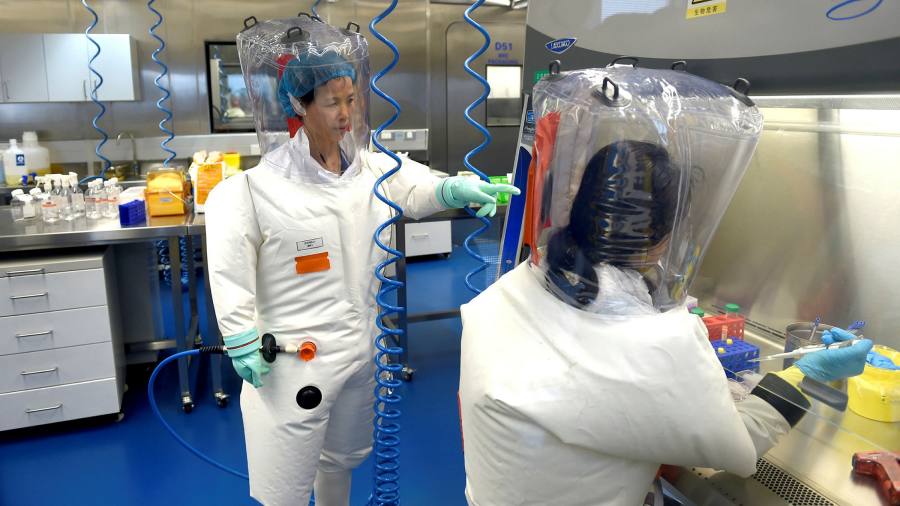[ad_1]
Laboratories working on novel viruses and other dangerous pathogens must be more tightly controlled to prevent accidents or terrorism causing another pandemic, a leading bioweapons expert has warned.
“I think we need to see biological hazards as an existential threat to the 21st century in the same way that atomic science was to the 20th century,†said Hamish de Bretton-Gordon the former commander of the UK’s Chemical, Biological, Radiological and Nuclear regiment.
Covid-19 has highlighted the threat caused by highly-infectious viruses, many of which are being studied or stored in facilities around the world with inadequate security protocols, de Bretton-Gordon told the Financial Times. While chemical facilities are closely monitored by the Organisation for the Prohibition of Chemical Weapons, there is no such designated body to police biological labs.
“The biological weapons convention says you should adhere to these rules, you should follow these guidelines and if there’s an accident, you should report it, but people have only paid lip service to that,†said de Bretton-Gordon, who led the British army’s responses to anthrax, sarin and chlorine gas attacks in Iraq and Syria, and also commanded Nato’s Rapid Reaction CBRN battalion. “The opportunity for theft, accident or leakage is high. Now that we’ve seen how quickly a pathogen can spread . . . we need our security to be absolutely watertight.â€
The former commander’s security warnings come as a World Health Organisation team investigating the origins of the pandemic has returned from China’s Wuhan Institute of Virology. The lab had been conducting experiments on bat coronaviruses in 2019 and quickly became the focus of theories that the novel coronavirus could have been released via a leak. De Bretton-Gordon said although this scenario was unlikely, the coronavirus pandemic has demonstrated the dangers that a lab breach would pose.

The most dangerous pathogens such as Anthrax and Ebola are kept in maximum containment Bio Security Level 4 labs, of which there are nearly 50 around the world according to a 2017 WHO study, although this list is now out of date. These include the Wuhan facility and the UK’s Defence Science and Technology Laboratory in Porton Down. BSL-4 labs are usually subject to high national security regulations and WHO biosecurity guidelines, but standards are not enforced or monitored at an international level.
The only mandatory inspections occur at the two labs which contain the last remaining stocks of the smallpox virus: Russia’s Vector Institute in Siberia, and the US Center for Disease Control in Georgia. Those facilities are visited every two years by the WHO to ensure safe storage and research procedures.
Even before the pandemic, there were concerns that safety standards at BSL-4 labs were not universally observed. US diplomats who visited the Wuhan Institute of Virology in 2018 warned of a “serious shortage of appropriately-trained technicians and investigators needed to safely operate this high-containment laboratory,†according to diplomatic cables seen by the Washington Post.
Professor Gregory Koblentz, a biodefence expert at George Mason University in Virginia, said the WHO’s difficulties in establishing basic facts about safety and security at the Wuhan Institute for Virology “indicates that we do not have sufficient oversight over these facilities and the activities happening inside themâ€.Â
“In the next couple of years there will definitely be more countries building BSL-4 labs,†he added. “So we need to be more proactive and develop better oversight now to prevent this increased research [on viruses] resulting in more accidents or reckless behaviour that could cause an outbreak that’s entirely avoidable.â€
Pathogens such as influenza and botulinum are usually kept at lower security in BSL-3 labs, which are subject to varying national guidelines. There are no official estimates of how many such labs exist around the world, though the figure is expected to be well over 3,000, according to de Bretton-Gordon.
Koblentz is working with Dr Filippa Lentzos, an expert in biological threats at King’s College London, to compile an unofficial database of BSL-4 labs which they will present at the World Health Assembly in May. The pair hope to extend the project to cover BSL-3 labs too.
The WHO told the FT it took the issue of lab biosecurity “very seriously†and that it was “aware of the growing demand and interest in BSL-4 labsâ€.Â
“In principle, all existing BSL-4 or similar facilities are under the strict oversight of respective national regulatory bodies,†it said. “Whether or not there is a need for an additional international or overarching regulatory framework is a matter for WHO member states to discuss.â€
De Bretton-Gordon served for 23 years in the British army, spending over a decade focused on chemical and biological attacks. He described biological weapons as “morbidly brilliant†because of their effectiveness and the fear they induce, adding that virus outbreaks in recent years had focused the minds of security officials. Ben Wallace, UK defence secretary, warned last month that there was a “growing threat of chemical or biological [attack]†around the world, and said the availability of information on the internet had provided a “turbo boost†for bad actors seeking to research these weapons.
At the height of the 2014-16 Ebola crisis, de Bretton-Gordon said he had provided advice to the US security services over concerns that terrorists would intentionally infect a suicide bomber with the virus before detonating explosives in a confined space such as the subway. At the same time, advances in synthetic biology have created new engineered pathogens, which he feared could also be put to malevolent use.
“Perhaps, before December 2019, the focus of security services was elsewhere,†he said. “I’m pretty certain they’re taking this matter extremely seriously now.â€
[ad_2]
Source link







